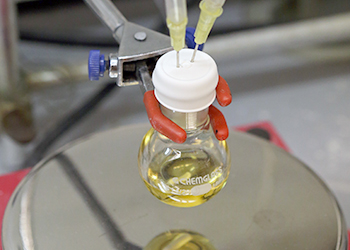Current Graduate Students - please see the Graduate Student Handbook.
Special awards and fellowships are given annually to graduate students in our programs in recognition of scholarship and leadership - please see Graduate Student Awards
PhD Program
We offer research opportunities in all areas of chemistry, including organic, physical, inorganic, and biochemistry. We develop your research, teaching, writing and presentation skills, to transform you into a highly-capable expert. Thanks to our 4:1 graduate student to faculty ratio, we give each of our students personal attention. Our graduates go on to work at leading companies (e.g., Dupont, Samsung), government labs (e.g., National Renewable Energy Lab, Los Alamos, NOAA) and universities (e.g., Yale, UW-Madison, U-Michigan).
*Please note: an MS is not required for pursuing a PhD.
Financial support
Tuition is fully covered, and students receive a competitive stipend for living expenses. Students are supported by either teaching assistantships or research assistantships.
The program
New students generally arrive in August and begin courses and teaching assistantships. They discuss research projects with potential advisors, and join research groups in November. Students combine research and 24 credits of coursework during their first two years, drawing from a variety of advanced courses. In their 2nd year students present a literature seminar, and in their 3rd year - a research seminar, qualifying them for PhD candidacy. Most students defend a dissertation and graduate after 5 years.
Read about our faculty members
Our students gain experience with advanced instruments, including NMR, GCMS, HPLC, spectrofluorometer, powder and single-crystal X-ray diffractometers, MALDI mass spectrometer, and the Marquette high-performance computing cluster.
Our students and faculty publish in leading journals such as JACS, Nature Comm, Angew Chem, J Org Chem, PNAS, ACS Energy Letters, J Phys Chem A/B/C/Lett, Organometallics, J Chem Phys, Chem Comm, Chem Eur J, Inorg Chem, Biochem and ACS Catalysis. Our research is funded by agencies such as National Science Foundation (NSF), National Institutes of Health (NIH), Department of Energy (DOE), National Aeronautics and Space Administration (NASA) and the ACS Petroleum Research Fund.
Application process
Applications are accepted year-round; evaluation for August begins in late December. To apply, you’ll need:
- A completed online application form and fee
- CV / resume
- Transcripts:
- Three recommendation letters from individuals familiar with your academic work
- Personal statement - tell us about your interests, research, work or other relevant experiences, and anything else you think will help us evaluate your application. It would be helpful to mention 2-3 faculty members whose research appeals to you, and you could see yourself studying with.
- GRE scores - optional for the 2023-2024 academic year
- For international applicants only: TOEFL score or other acceptable proof of English proficiency
1 Upon admission, final official transcripts from all previously attended colleges/universities, with certified English translations if original language is not English, must be submitted to the Graduate School within the first five weeks of the term of admission or a hold preventing registration for future terms will be placed on the student’s record.
2 Upon admission, an official course-by-course transcript/academic record evaluation must be submitted to the Graduate School within the first five weeks of the term of admission or a hold preventing registration for future terms will be placed on the student’s record.
MS program
Marquette’s Chemistry MS program is designed to enhance your professional abilities and advance your career. We offer two tracks, focused on research or on enrichment and skills strengthening. A Master’s degree is ideal for professional chemists aspiring to the next level of professional appointments, and for high school teachers interested in getting a broader and richer base of knowledge.
*Please note: an MS is not required for pursuing a PhD. If your final goal is a PhD, please apply directly to our PhD program.
Cost
Graduate/Professional cost of attendance
Plan A option
Plan A is designed for individuals preparing for careers as professional chemists. It has a strong focus on research. Students complete 30 post-baccalaureate credits (24 credits of coursework and 6 credits of Master's thesis), as well as write and defend a Master's thesis.
Plan B option
Plan B is exclusively designed for high school teachers wishing to enhance their scientific backgrounds. It focuses on enrichment and skill strengthening. Students complete 30 post-baccalaureate credits (24 credits of coursework and 6 credits of Master's essay), as well as write an essay.
The program
- Students present a literature-based seminar during their 2nd year.
- Students in Plan A author and successfully defend a Master's thesis representing independent research they have carried out under the supervision of a faculty research director – Read about our faculty members
- Students in Plan B submit an essay review of the literature of a selected area of chemistry.
- Public defense of the thesis or essay constitutes a comprehensive exam.
Application process
Applications are accepted year-round; evaluation for August begins in late December. To apply, you’ll need:
- A completed online application form and fee
- CV / resume
- Transcripts from all current and previous colleges/universities (except Marquette)
- Three recommendation letters from individuals familiar with your academic work
- Personal statement - tell us about your interests, research, work or other relevant experiences, and anything else you think will help us evaluate your application. It would be helpful to mention 2-3 faculty members whose research appeals to you, and you could see yourself studying with.
- Optional GRE scores
- For international applicants: TOEFL or IELTS score or other acceptable proof of English proficiency (e.g., documentation that your university’s teaching language is English)
For more information


